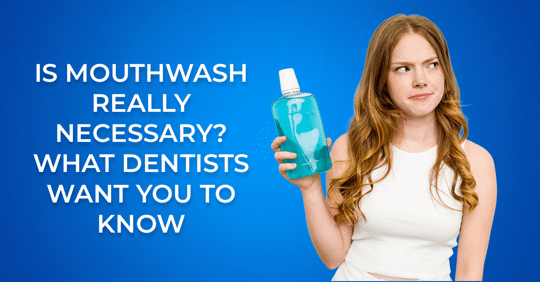For many people, swishing with mouthwash is a quick and refreshing way to feel like their teeth are clean and their breath is fresh. But is mouthwash truly necessary—or just a marketing gimmick?
At ProHEALTH Dental, where we prioritize oral health as a key factor in your overall wellness, we believe it’s important to separate fact from fiction. Here’s what our dental professionals want you to know about mouthwash: when it helps, when it doesn’t, and how to choose the right one for your needs.
What Is Mouthwash, Really?
Mouthwash—also known as an oral rinse—is a liquid solution designed to be swished in the mouth to help reduce bacteria, freshen breath, and sometimes deliver specific therapeutic benefits.
There are two primary types of mouthwash:
- Cosmetic mouthwash: Primarily masks bad breath and leaves a pleasant taste, but doesn’t necessarily address the root causes of oral health issues.
- Therapeutic mouthwash: Contains active ingredients like chlorhexidine, fluoride, or essential oils to reduce plaque, fight gingivitis, prevent tooth decay, or help with dry mouth.
Is Mouthwash a Replacement for Brushing and Flossing?
Absolutely not. Mouthwash should never replace daily brushing and flossing. Brushing removes plaque and food particles from the surface of the teeth, while flossing reaches between teeth to clean areas that brushes can’t access. Mouthwash can’t physically remove debris or plaque. Instead, it should be seen as an added layer of protection that complements your oral hygiene routine.
Think of it like this: brushing and flossing are the foundation, and mouthwash is the sealant that supports that foundation—especially if you’re using a therapeutic rinse prescribed by your dentist.
When Mouthwash Is Helpful
While it’s not essential for everyone, mouthwash can be particularly helpful in certain cases:
- Gingivitis or early gum disease: Antimicrobial rinses can reduce inflammation and bacteria buildup along the gum line.
- High cavity risk: Fluoride rinses can strengthen enamel and reduce the risk of decay, especially in patients prone to cavities.
- Orthodontic patients: Braces can make brushing and flossing more difficult, so rinsing can help dislodge food particles and reduce bacteria.
- Dry mouth: Specialized rinses can ease symptoms of dry mouth and help maintain a healthy oral environment.
- After oral surgery: In some cases, your dentist may recommend a mouthwash to reduce infection risk and promote healing.
For individuals seeking professional guidance and preventative care, ProHEALTH Dental’s Howard Beach dentists offer comprehensive evaluations and recommendations tailored to your specific oral health needs.
When Mouthwash Might Not Be Necessary
If you maintain excellent oral hygiene—brushing twice a day, flossing daily, and visiting your dentist regularly—you may not need mouthwash at all. In fact, using the wrong kind of mouthwash can sometimes do more harm than good. Alcohol-based rinses, for example, can cause dry mouth and irritation in some patients, and may even disrupt the natural balance of oral bacteria if overused.
Additionally, if you’re using a cosmetic mouthwash to cover up chronic bad breath, it could be masking a deeper issue like gum disease, decay, or an underlying health condition. In that case, you should consult your dentist rather than rely on mouthwash as a long-term solution.
The Link Between Oral and Overall Health
At ProHEALTH Dental, we emphasize the mouth-body connection in all aspects of care. Research continues to show that poor oral hygiene is linked to serious systemic health issues such as heart disease, diabetes, and even respiratory infections. This means that tools like mouthwash—when used appropriately—can be part of a larger strategy to protect not just your smile, but your entire body.
In particular, managing inflammation in the gums through proper hygiene and, when needed, therapeutic mouthwashes can reduce the risk of inflammatory diseases elsewhere in the body. So while mouthwash alone won’t prevent chronic illness, it can play a supporting role in a broader, preventive healthcare plan.
Choosing the Right Mouthwash
With so many products on the market, it’s easy to feel overwhelmed. The best approach is to consult your dentist about which type of rinse, if any, is best for you.
Some general tips include:
- Look for the ADA Seal of Acceptance: This ensures the product has been scientifically evaluated and meets safety and effectiveness standards.
- Avoid alcohol if you have dry mouth: Alcohol can make dryness worse.
- Use fluoride rinses to help prevent decay, especially if you’re at high risk for cavities.
- Follow directions: Don’t rinse with water immediately afterward, as it can wash away beneficial ingredients.
The Bottom Line
So, is mouthwash necessary? For some people, it can offer real benefits. For others, it may be unnecessary or even counterproductive if misused. The key is understanding your own oral health needs and using mouthwash as one part of a comprehensive dental care plan.
If you’re unsure about which mouthwash to use—or whether you need one at all—our team at ProHEALTH Dental is here to help. Trust our team for personalized general dentistry care and advice rooted in science and whole-body wellness.

